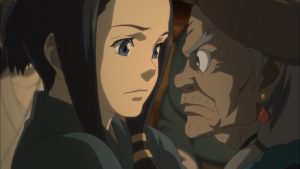 One of the biggest challenges facing me in this re-watch of Seirei no Moribito is pacing myself. In truth, there’s never an episode of this series that doesn’t make me want to immediately launch the next one – faultless pacing is among its innumerable virtues. But of course, that would undercut the point of covering it in the first place, and as in earlier re-watches my desire for it not to be over too fast is the equal of my desire to power through it.
One of the biggest challenges facing me in this re-watch of Seirei no Moribito is pacing myself. In truth, there’s never an episode of this series that doesn’t make me want to immediately launch the next one – faultless pacing is among its innumerable virtues. But of course, that would undercut the point of covering it in the first place, and as in earlier re-watches my desire for it not to be over too fast is the equal of my desire to power through it.
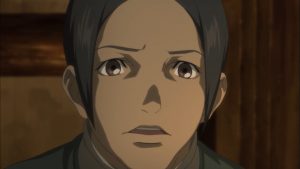 On the plus side, you do have the luxury of noticing things you might not have the first few times around. For example, I actually never caught the fact that Touya dropped the egg he was holding in his chopsticks during Torogai’s “Tamago!” moment, and it was wobbling around on the floor. That came just before Kamiyama gave us the title drop. Despite what one may initially assume (and some people still believe, puzzlingly) the “guardian” of the title is not Balsa, but Chagum. And the symmetry of this is not accidental – both have had this task thrust upon them uninvited. Balsa has embraced it – Chagum obviously still needs some time before he can get to that point.
On the plus side, you do have the luxury of noticing things you might not have the first few times around. For example, I actually never caught the fact that Touya dropped the egg he was holding in his chopsticks during Torogai’s “Tamago!” moment, and it was wobbling around on the floor. That came just before Kamiyama gave us the title drop. Despite what one may initially assume (and some people still believe, puzzlingly) the “guardian” of the title is not Balsa, but Chagum. And the symmetry of this is not accidental – both have had this task thrust upon them uninvited. Balsa has embraced it – Chagum obviously still needs some time before he can get to that point.
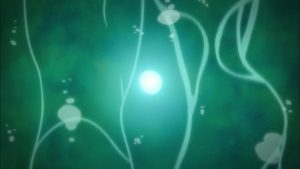 Torogai has all the diplomacy of a dive bar bouncer, but she brings an understanding of events that both the cast and the audience desperately need. She’s a wonderful addition to the cast, and like all the major characters here it doesn’t take long to realize that there’s more to her than first impressions suggest. Seirei no Moribito is as much as anything a series where quiet, understated moments soar with significance and poignancy, and I loved the conversation between Torogai and Balsa after the others had gone to console Chagum (after Torogai freaked him out). This is a very revealing sequence where Balsa is concerned, and what’s revealed is an extremely flattering portrait of an extraordinary woman.
Torogai has all the diplomacy of a dive bar bouncer, but she brings an understanding of events that both the cast and the audience desperately need. She’s a wonderful addition to the cast, and like all the major characters here it doesn’t take long to realize that there’s more to her than first impressions suggest. Seirei no Moribito is as much as anything a series where quiet, understated moments soar with significance and poignancy, and I loved the conversation between Torogai and Balsa after the others had gone to console Chagum (after Torogai freaked him out). This is a very revealing sequence where Balsa is concerned, and what’s revealed is an extremely flattering portrait of an extraordinary woman.
 Again, subtext is everywhere. After Chagum’s state funeral, Tanda, Touya and Saya run into a group of farmers trekking through the mountains close to his hut. They’re getting ready to join a manhunt (though it’s a woman they’re hunting), as half of New Yogo seems to be. This is the Emperor’s newest gambit, but Balsa is already crafting her own response. Tanda is dispatched to the Blue Hand, a slaver’s group in Lower Ogi, but he’s not told what he’s been sent to purchase – because, of course, Balsa knows he wouldn’t approve. Tanda is furious of course, because as usual Balsa is acting on her own and declining to put her full trust in him. And so the cycle repeats itself.
Again, subtext is everywhere. After Chagum’s state funeral, Tanda, Touya and Saya run into a group of farmers trekking through the mountains close to his hut. They’re getting ready to join a manhunt (though it’s a woman they’re hunting), as half of New Yogo seems to be. This is the Emperor’s newest gambit, but Balsa is already crafting her own response. Tanda is dispatched to the Blue Hand, a slaver’s group in Lower Ogi, but he’s not told what he’s been sent to purchase – because, of course, Balsa knows he wouldn’t approve. Tanda is furious of course, because as usual Balsa is acting on her own and declining to put her full trust in him. And so the cycle repeats itself.
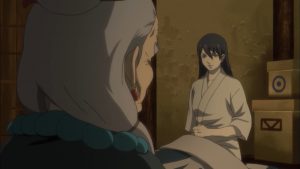 Balsa is a hard, practical woman. It’s clear her past interactions with the Blue Hand have been less than cordial, for obvious reasons – slavery is not the sort of thing she’d approve of herself. But dealing with these men suits her current (desperate) need, and it’s no time to be either idealistic or sentimental. It’s not as though the people she buys won’t be better off for it, though her main concern is the cover a bunch of foreigners wandering about will provide Chagum and herself. This is never explained to us – Kamiyama and Uehashi trust us to figure it out with the information we’re given.
Balsa is a hard, practical woman. It’s clear her past interactions with the Blue Hand have been less than cordial, for obvious reasons – slavery is not the sort of thing she’d approve of herself. But dealing with these men suits her current (desperate) need, and it’s no time to be either idealistic or sentimental. It’s not as though the people she buys won’t be better off for it, though her main concern is the cover a bunch of foreigners wandering about will provide Chagum and herself. This is never explained to us – Kamiyama and Uehashi trust us to figure it out with the information we’re given.
 This short, idyllic gathering of the forces of good is over. Balsa must flee with Chagum in tow, Torogai must go to the Knot (where Sayu and Nayug come together) and try to dig deeper into the meaning behind Chagum’a selection as the seirei no moribito. Tanda is more or less left holding the fort (and the horse), which seems to be his recurring curse in life – lacking Torogai’s gift for magic and Balsa’s physical prowess, he must content himself with being the rock that they anchor to as they drift in the sea of time.
This short, idyllic gathering of the forces of good is over. Balsa must flee with Chagum in tow, Torogai must go to the Knot (where Sayu and Nayug come together) and try to dig deeper into the meaning behind Chagum’a selection as the seirei no moribito. Tanda is more or less left holding the fort (and the horse), which seems to be his recurring curse in life – lacking Torogai’s gift for magic and Balsa’s physical prowess, he must content himself with being the rock that they anchor to as they drift in the sea of time.


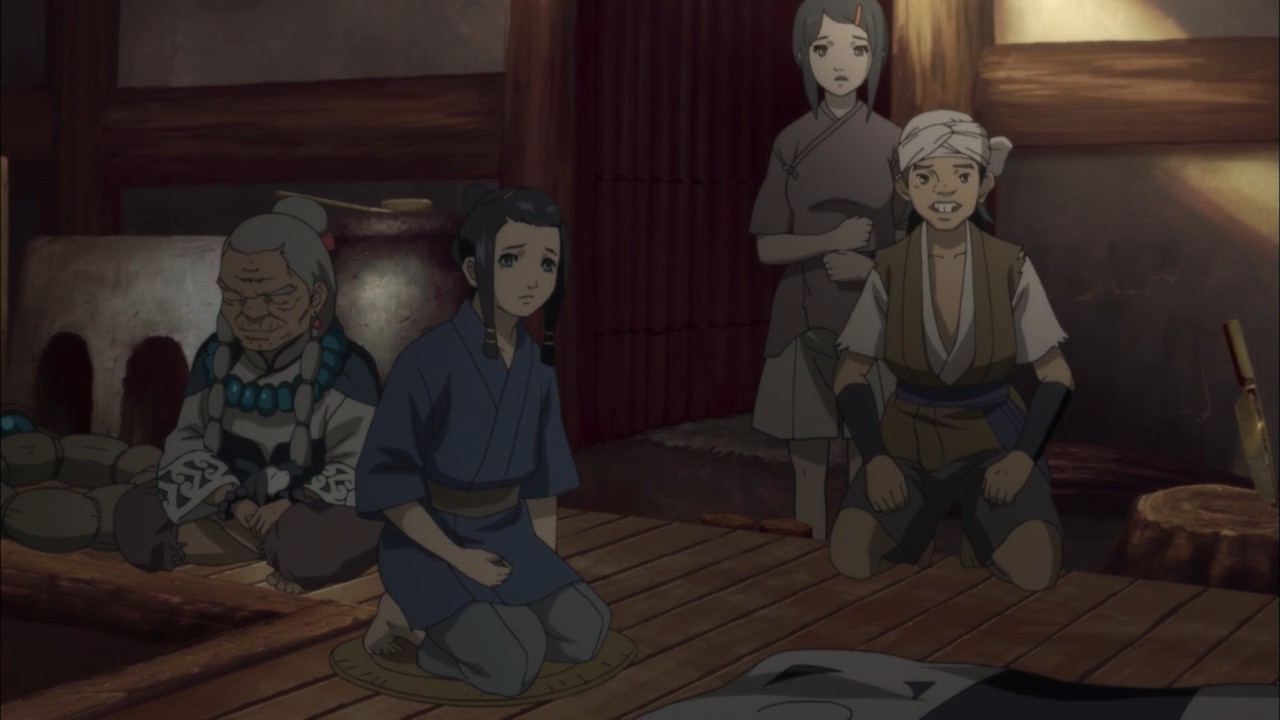


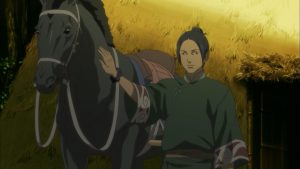

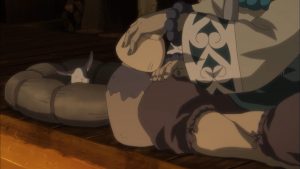

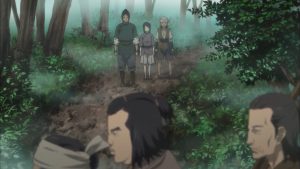

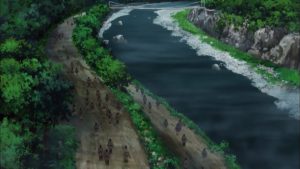
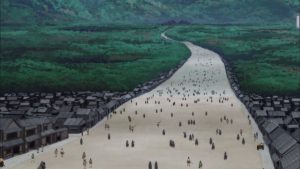
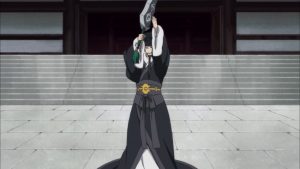
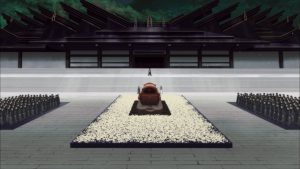

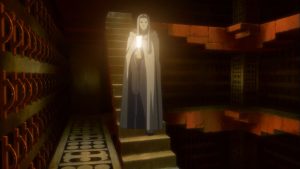
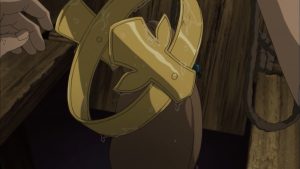
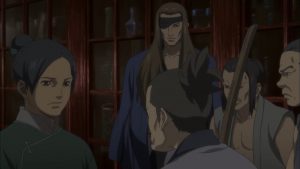

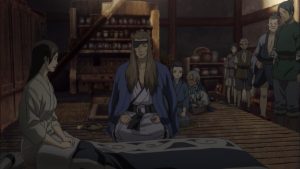

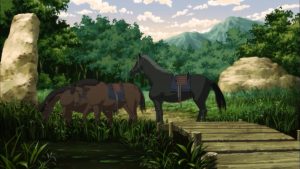





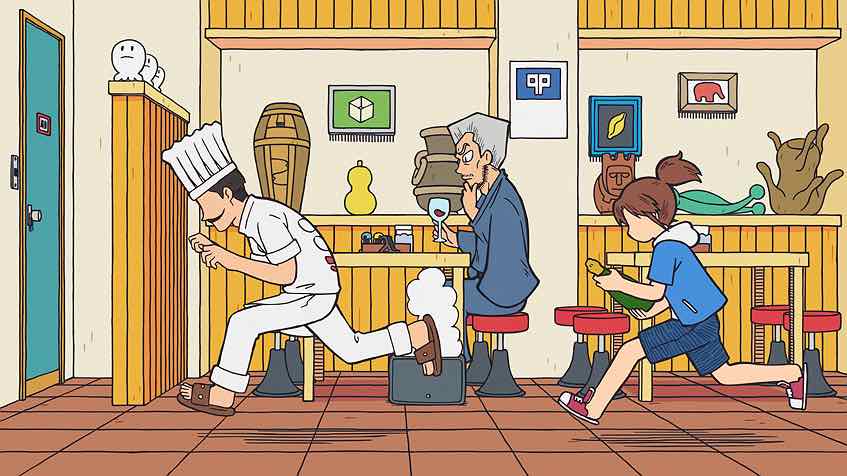
Panino Manino
May 15, 2020 at 12:01 pmI was expecting that you would continue to watch and write about two episodes at a time… I couldn’t resist and already watched the next before coming here.
You’re right, exposition is one of Moribito’s greatest strengths. This episode is great because it tell us a lot about Balsa and Tanda but without actually talking about their relationship. We just see how Balsa acts and treats him, how his reacts and poor him… Instead os explaining directing the series gives us little scenes from where we can extract the information ourselves. Of course, there will be times when things are properly said and explained, but only on the appropriated times.
Other thing that this episode does marvelously is showing us how great Balsa really us. Is this episode, one that she passes the whole time sitting injured, that cements how strong a warrior she is and why she is the protagonist in this story, not the ones where she fights with her spear. She simply finds a way to escape from that situation herself, and makes it happen just be sending a few message boys. At the same time this also shows us that all this strength comes at a personal cost to her, and that hurts people who care for her unnecessarily.
And talking about things you notice rewatching, I don’t know if I had appreciated the Emperor actions before. It was his decision to change the approach and use Chagum’s funeral to capture Balsa. He wasn’t passive, he could think by himself instead of leaving everything for his shadows. And in the end Balsa outsmarted him. This was also a victory against Chagum’s father.
Guardian Enzo
May 15, 2020 at 1:59 pmYes, the Mikado is no fool (he becomes a much more important character in the later novels). Chagum is whip-smart himself, and he had to get that from somewhere – and we see both his parents showing their wit quite impressively in these first five episodes. But the Mikado does not have Balsa’s hands-on real world experience, to say the least, which I think she uses to great advantage.
Panino Manino
May 16, 2020 at 6:13 amI dislike this idea of blood inheritance.